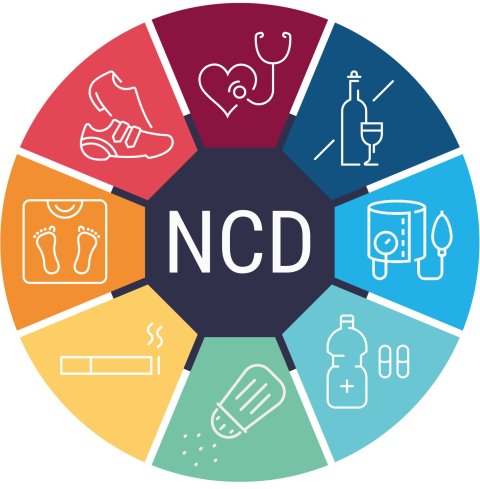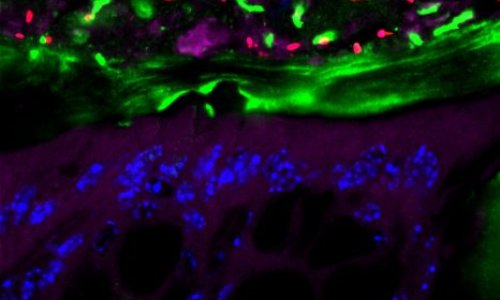Image source: Unsplash/Christian Lue
Article • Joint action
A pan-European effort to tackle cancer and NCDs
This February, the Norwegian Institute of Public Health officially launched the ‘Joint Action on cancer and other non-communicable disease prevention project‘ (JA PreventNCD).
Report: Cornelia Wels-Maug
In the four-year-initiative, 22 EU member states plus Iceland, Norway and Ukraine have joined forces to combat the increasing burden of non-communicable diseases (NCDs) across national borders.
The Norwegian Directorate of Health leads the project and its Professor Knut-Inge Klepp, scientific coordinator of the project, emphasizes the need for the collaborative approach: ‘The pandemic has underscored the importance of cross-border cooperation in addressing health crises. NCDs, while slower in their progression, represent a significant health crisis that requires coordinated action.’
Investing in prevention

© Toxa2x2/M.Style/SkyLine/North/palau83 – stock.adobe.com (Editing: HiE/Behrends)
Given the fact that a large proportion of NCD-related deaths are avoidable and expenditures on prevention stand only at around 3% of national health budgets in the EU1, this initiative is a worthwhile endeavour. It has a total budget of €95.5 million, of which the EU funds €76.4 million within the framework of its EU4Health programme. The EU contribution represents 20% of the EU's total health budget. Linda Granlund, project coordinator and head of the Public Health and Prevention Division at the Norwegian Directorate of Health said on the project launch in Oslo: ‘Cancer and other NCDs constitute a large proportion of the total burden of disease in Europe. NCDs can be prevented, and sadly we have not managed to tackle the challenges in an effective and coordinated way up until now. This project represents a paradigm shift, with 20% of health budgets dedicated to prevention—a symbol of Europe's evolving approach to health.’1
A framework for addressing common risk factors
At the core of JA PreventNCD is its commitment to unify efforts, reduce fragmentation and avoid duplication when it comes to reducing cases of NCDs. The project wants to establish a holistic approach to prevention amongst the participating countries whilst addressing the common underlying risk factors both on a personal and societal level. To do so, the initiative combines a healthcare focused agenda with other topics like taxation and regulation in addition to a healthy living environment. It also aims to strengthen national authorities across different levels to implement measures to promote health such as raising coherence in policies addressing risk factors and social inclusion. Furthermore, it foresees to assess the effects of prevention strategies with the help of rigorous evaluation processes to optimize them. A key goal of the initiative is to tackle social inequalities in view of their contribution to NCD risks. A core instrument for the project is the establishment of a robust European infrastructure for monitoring NCD-related health determinants such as inactivity, unhealthy diet, overweight and obesity as well as harm related to alcohol consumption.
The medical agenda
We will develop new interdisciplinary care pathways in the area of genetic (cancer) predisposition in the European context in order to ensure structured, resource-adapted care systems
Anke Katharina Bergmann
The medical agenda of JA PreventNCD incorporates efforts to advance the early detection of people at risk, including the use of genetic profiling. Prof Dr Anke Katharina Bergmann, Lead Personalised Genomics, Deputy Director Institut for Human Genetics at Hannover Medical School, which takes part in the project on the German side, emphasis the role of genetic profiling for the prevention of NCDs. In her view, genetics will be increasingly essential for early diagnoses and prevention: ‘As part of the “Joint Action Prevent NCD”, we will develop new interdisciplinary care pathways in the area of genetic (cancer) predisposition in the European context in order to ensure structured, resource-adapted care systems and thus detect (cancer) diseases earlier, treat them better or ideally prevent them.’2
The project also investigates more patient-centered interventions, integrated care pathways and eHealth solutions. As part of its monitoring agenda, JA PreventNCD has the goal to improve data capture management and will use AI-based algorithms for analysis and modelling purposes. Prof Dr Lars Schaade, President of the German Robert Koch Institute (RKI), which is also a stakeholder in the initiative, explains: ‘One of the main tasks will be to systematically collect and collate relevant health data. The RKI will contribute such “data for action” from its own and international studies and projects in order to strengthen the prevention of major common diseases, promote health equity and promote health and well-being for all people.’2
AI will be an invaluable tool to drive the prevention agenda
There is a strong momentum in healthcare systems to shift towards a prevention-centered approach to avoid suffering as well as render healthcare delivery more sustainable. Technological and medical progress have made it possible to jointly analyse individuals’ genetic information and the gathered medical, lifestyle and environmental data to gain new insights into human health. The algorithms used for analysing those data and modelling health scenarios are based on artificial intelligence (AI).
The project’s collaborative approach resembles in many aspects the UK’s largest ever research project Our Future Health on which we reported recently. Both put the notion of prevention rather than curation at their core and will help to enable a paradigm shift in how we view health.
References:
06.03.2024





